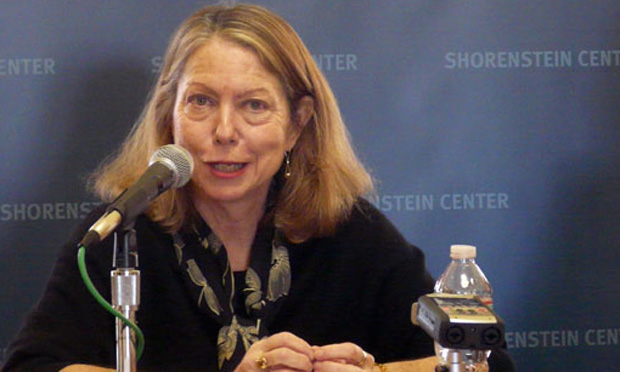Jill Abramson, the former executive editor of The New York Times who now is a visiting lecturer at Harvard, shared her opinions on the quality of the media’s 2016 campaign coverage during a talk she gave at Harvard Kennedy School. An audio file of the talk, which included a question-and-answer session, is available online through Harvard’s Shorenstein Center on Media, Politics and Public Policy.
Among Abramson’s key takeaways: The media, as a whole, has not gone deep enough in its coverage and does not always focus on issues that are most important to the public. She praised the work of BuzzFeed, and criticized the use of questionable polls.
Abramson, who has covered politics since 1976, said she developed her approach to political reporting at The Wall Street Journal. It was there she learned “not to focus on up-to-the-second breaking news and little developments inside the campaign that were for an audience of insiders, but to really go out and understand, yourself, by listening to people, what the election was really about,” she said.
“It shouldn’t have been such a surprise to the media that Donald Trump and Bernie Sanders have emerged so forcefully and are very much in contention for the nominations of their parties,” said Abramson, commenting on how many news organizations were slow to devote resources to covering Trump as a real candidate.
What Abramson found particularly lacking were in-depth profiles of some of the candidates. She praised a 2014New Yorker article about Ted Cruz’s legal background as a good example of this style. Abramson noted, though, that she didn’t think quality political journalism was nonexistent, and pointed to The Washington Post’s current series on how the candidates make decisions, as well as BuzzFeed. “They are on it 24/7,” she said, and added that “BuzzFeed isn’t just covering the moment. They have a 14-person investigative unit with editors and reporters. They’re going places that others don’t.”
“Giving the highest quality information to the voters is the most important thing we do every four years,” said Abramson of the role of the press. “I would just like to see this deeper layer take hold,” which she acknowledged is challenging in the face of newsroom budget and staff cuts.
Abramson identified the use of questionable polls as another pain point in election coverage. “Why journalists aren’t savvy enough about which polls to pay attention to is, I think, [because] their level of knowledge isn’t deep enough. They are hungry to have the latest anything in this 24/7 news cycle,” she said. “Hearing of a new poll that shows something surprising or different is like honey to bees.”
Regarding how to improve political coverage, Abramson said news outlets should empower reporters to call out inaccuracies on the spot, which some debate moderators have been doing. “If a reporter has gone deep and is knowledgeable, when something is wrong, you can say it’s wrong or a lie. There are no journalistic rules, nothing in The Washington Post or AP style books say you can’t do that. But you have to do it with real authority based on reporting and reading deeply about the issues,” she said. “I would want reporters to be somewhat freer to say that something is extreme, and then not only say it but show it through your knowledge of someone’s record.”
Abramson also identified what she called a widening gulf between the citizenry and the press. While journalists may see it as their constitutional duty to hold power accountable by reporting on Hillary Clinton’s emails, such stories may not resonate with the average person, said Abramson. “I have traveled quite a bit around the country — I went to many, many towns in New Hampshire. No one is talking about Hillary Clinton’s email. Especially in political reporting, a lot of what we the media focus on doesn’t touch people. It isn’t part of their daily concerns.”
In the question-and-answer session, Abramson discussed, among other topics, the line between analysis and opinion, political polarization and social media, and the competition between The New York Times and The Washington Post.


Expert Commentary